UK Ministry of Defence says Ukraine has ‘likely made good progress’ in some areas but that progress is ‘slower’ in others
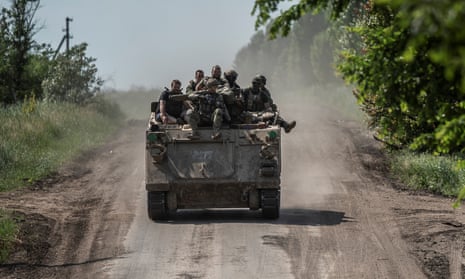
Live feed
From 37m ago
Ukrainian forces have made advances on parts of frontline near Bakhmut, official says
Counterattacking Ukrainian forces have advanced up to 1,400 metres at a number of sections of the front line near the eastern city of Bakhmut in the past day, a military spokesperson said on Saturday.
The advance is the latest in a series of similar gains reported this week by Kyiv near Bakhmut, which Russia said it had fully captured last month after the bloodiest and longest battle since it began its full-scale invasion in February 2022.
“We’re trying...to conduct strikes on the enemy, we’re counterattacking. We’ve managed to advance up to 1,400 metres on various sections of the front,” the spokesperson for the eastern military command said when asked about fighting near Bakhmut.
Ukrainian forces, he added, had inflicted heavy Russian troop casualties and destroyed military hardware in the area.
The Guardian has not been able to independently verify this.
Key events
The UK will provide an extra £16m of humanitarian aid to Ukraine after the destruction of the Kakhovka dam.
The money consists of £10m for the Red Cross Movement, £5m for the United Nations Office for the Coordination of Humanitarian Affairs (OCHA) and £1m for the International Organization for Migration (IOM).
Boats, community water filters, water pumps and waders will be given to Ukraine and are expected to arrive there next week.
Ukrainian deputy foreign minister, Andriy Melnyk, tweeted “Welcome to Ukraine Mr Prime Minister” on the arrival of the Canadian prime minister, Justin Trudeau, in Kyiv.
He accompanied the post with a photograph of them shaking hands on the platform of a train station.
Ukrainian forces have made advances on parts of frontline near Bakhmut, official says
Counterattacking Ukrainian forces have advanced up to 1,400 metres at a number of sections of the front line near the eastern city of Bakhmut in the past day, a military spokesperson said on Saturday.
The advance is the latest in a series of similar gains reported this week by Kyiv near Bakhmut, which Russia said it had fully captured last month after the bloodiest and longest battle since it began its full-scale invasion in February 2022.
“We’re trying...to conduct strikes on the enemy, we’re counterattacking. We’ve managed to advance up to 1,400 metres on various sections of the front,” the spokesperson for the eastern military command said when asked about fighting near Bakhmut.
Ukrainian forces, he added, had inflicted heavy Russian troop casualties and destroyed military hardware in the area.
The Guardian has not been able to independently verify this.
Ukraine’s nuclear energy agency says it has put the last operating reactor at Europe’s largest nuclear power plant into a “cold shutdown” as a safety precaution amid flooding from the collapse of the Kakhovka dam.
Five out of six reactors at the Zaporizhzhia Nuclear Power Plant, which is occupied by Russian forces, are already in a state of cold shutdown.
Energoatom, the Ukrainian nuclear agency, said in a statement late on Friday that there was “no direct threat” to the Zaporizhzhia plant due to the breach of the Kakhovka dam further down the Dnieper River, which has forced thousands of people to flee flooding and also sharply reduced water levels in a reservoir used to help cool the facility.
The last reactor was put into cold shutdown on Thursday, Energoatom said.
The site’s power units have not been operating since September last year. The head of the International Atomic Energy Agency is due to visit Ukraine in the coming days.
Here are some more images of Justin Trudeau in Ukraine.
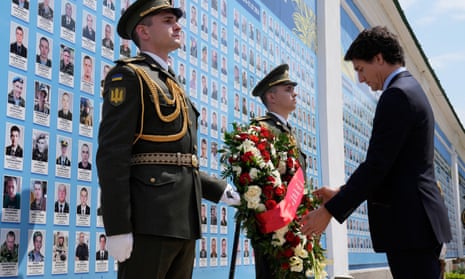
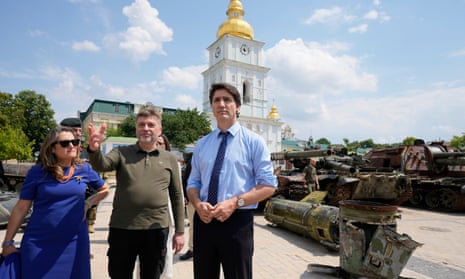
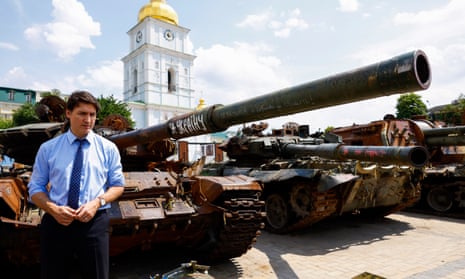
German chancellor, Olaf Scholz, said on Saturday that he planned to speak to the Russian president, Vladimir Putin, on the phone soon to urge him to withdraw troops from Ukraine.
Speaking at a convention of the German Protestant church in Nuremberg, Scholz said he had spoken to Putin on the phone in the past. “I plan to do it again soon,” he added.
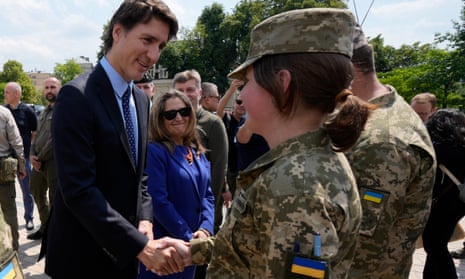
Here’s some more on Justin Trudeau’s visit to Ukraine.
Trudeau paid his respects at a memorial site in central Kyiv to Ukrainian soldiers who have been killed fighting pro-Russian forces since 2014, Reuters reported.
Nato member Canada, which has one of the world’s largest Ukrainian diasporas, has supplied military and financial assistance to Ukraine during the full-scale invasion launched by Russia in February 2022.
Russian activists and dissidents from the Anti-War Human Rights Coalition say volunteers are reporting that 1,842 left bank residents including 338 urgent cases around Olekshy, and nearby, are being prevented from leaving by Russian authorities. They also include 148 children and 243 elderly people.
The coalition has sent a letter to the US calling for diplomatic pressure to be put on Moscow to allow humanitarian relief.
The letter says:
The Ukrainian government has appealed to the United Nations and the Red Cross, but currently did not receive any feedback.
We request you to use diplomatic means to ensure that the Russian side provides assistance to the affected residents of Oleshki, or that the Russian side stops hindering the work of the volunteers willing to help the victims.
“At the same time we would like to appeal to the Red Cross to interfere and provide humanitarian aid as it is near impossible for local volunteers to evacuate such an amount of people with the means available.
Justin Trudeau visits Ukraine
Canadian prime minister, Justin Trudeau, has arrived in Kyiv.
Footage from the BBC shows Trudeau in the capital.
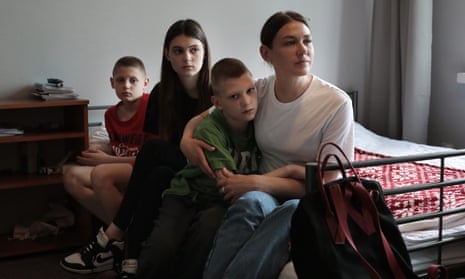
A £150m fund to help Ukrainians into their own homes has been announced by the UK government.
More than 124,000 people have arrived in the UK under the Homes for Ukraine scheme since Russia invaded Ukraine in February last year.
The new money will go to councils to help Ukrainian families into private rented accommodation and find work. It will also go towards continuing sponsorship arrangements, as many guests are in their second year in the UK.
The funding is being divided according to the number of Ukrainians in each nation – England will receive about £109m, Scotland £30m, Wales £8m and Northern Ireland £2m.
Read the full report here.
Here are some images coming to us from the wires.
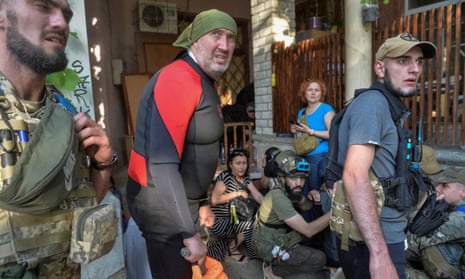
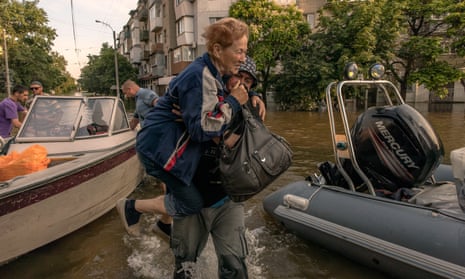

The southern reach of the Dnipro River is likely to return to its banks by 16 June after the breach of Ukraine’s Kakhovka dam this week, a Russian-installed official said on Saturday.
Vladimir Saldo, who heads the Russian-controlled part, said the water level at Nova Kakhovka, the town adjacent to the dam on the downstream side, had now dropped by 3 metres (10 feet) from Tuesday’s peak, Reuters reported.
“The pumping of water and garbage collection from the streets have started,” he said, adding that more than 6,000 people had been evacuated from the flooded districts of Nova Kakhovka and from Oleshky and Hola Prystan.
He said preliminary calculations by the Russian hydroelectricity producer RusHydro indicated the Dnipro would return to its usual course below the now-destroyed Kakhovka power station by 16 June.
This could not be independently verified.
Here’s more from Prof Snyder.
When asked whether he believed the counteroffensive would make good progress, he said:
Military history teaches us that these things are very, very difficult to predict, but I think a lot of it hangs on, just as it does generally in war, whether the Ukrainian advances generate political pressure in Moscow and whether that political pressure leads back towards panic in the Russian front lines.
I think in general, the Ukrainians have done better than people expect, and I would cautiously predict that they will do better than people expect this time as well.
Yale historian Prof Timothy Snyder, who has written about Ukraine and Russia, and also about tyranny and the erosion of democracy, said he did not believe the destruction of the Kakhovka dam would ultimately affect Ukraine’s counteroffensive.
He told BBC Radio 4’s Today programme:
I don’t think … it will have fundamental implications for the Ukrainian counteroffensive for now.
It’s diverting Ukrainian soldiers. Ukrainian soldiers are evacuating people. Ukrainian soldiers are using their drones to drop water onto roofs instead of grenades into Russian tanks.
I think that will make a difference for a few days or a few weeks, but I think there are plenty of other directions the Ukrainian counteroffensive was meant to take, and remarkably, it’s still taking those.
He added it was “remarkable” that Ukraine is able to carry out a counteroffensive and a rescue operation at the same time.

Russia-Ukraine war at a glance: what we know on day 471 of the invasion
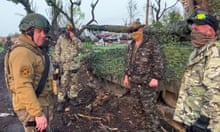
Wagner group accused of stoking ‘anarchy’ on Russia’s frontlines
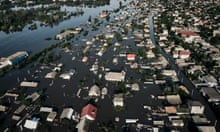
Seismic data adds to evidence Ukraine’s Kakhovka dam was blown up

Zelenskiy steps up criticism of International Red Cross over inaction at Kakhovka dam
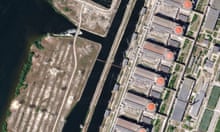
Ukraine: cooling pond at Zaporizhzhia plant at risk after dam collapse – report
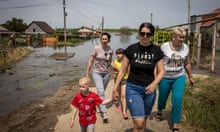
‘They hate us so much’: villagers flee flooding after dam attack

Dam collapse a global problem as waters may poison Black Sea, Zelenskiy says

Kakhovka dam collapse unlikely to hurt Ukraine counteroffensive but will have long-term impact


